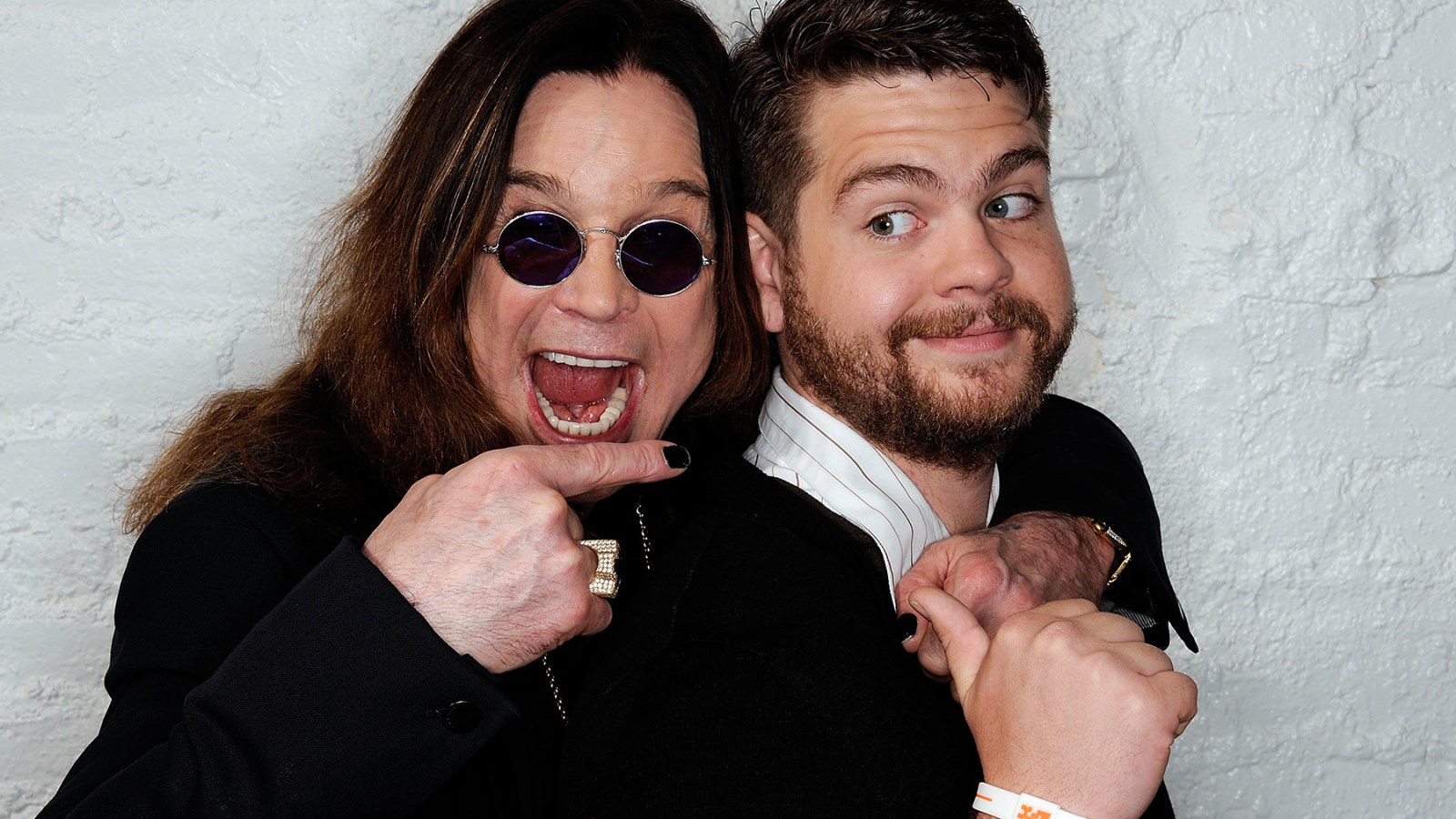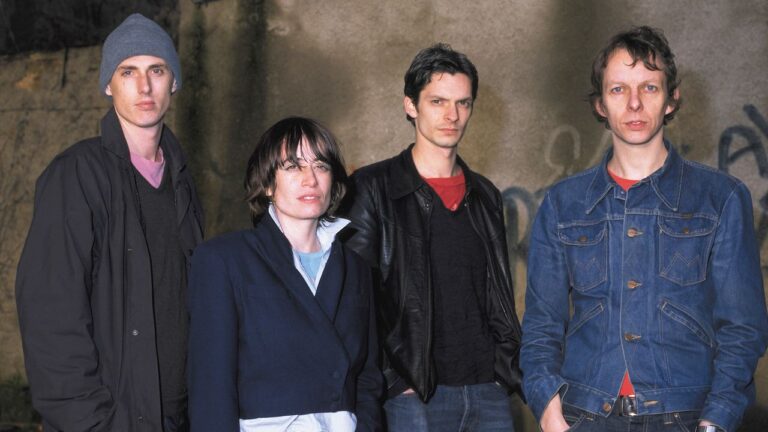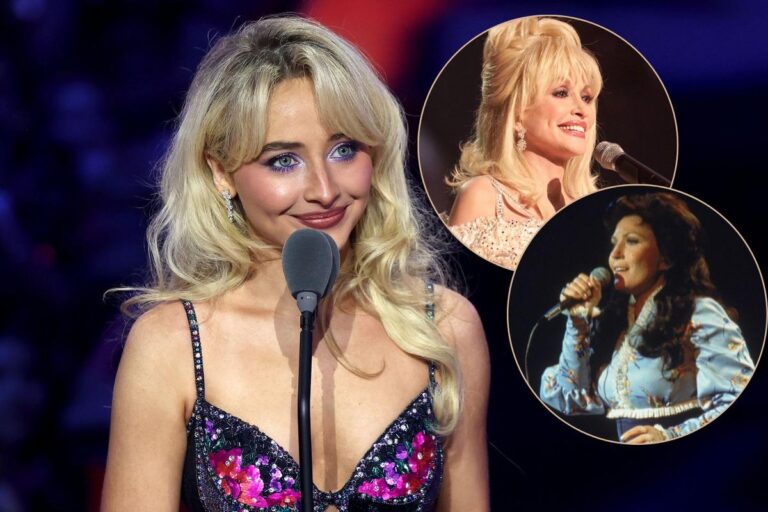Growing up, Jack Osbourne felt like he had to share his dad with the world. “He was always touring,” Ozzy’s youngest son, 39, tells Rolling Stone over Zoom from his Los Angeles home on Tuesday. “I really feel like it was in adulthood that we got to know each other, doing [the travel TV series] World Detour.”
Although MTV’s reality show The Osbournes displayed a tight bond between father and son, World Detour, which aired for three seasons between 2016 and 2018, gave Jack the opportunity to spend true quality time with the man who helped invent heavy metal with Black Sabbath and went on to greater fame as a solo artist.
“I remember having these thoughts when we were doing it and being like, ‘Oh, I’m so lucky I got to do this with him,’” he says of the show, which found the tourist duo visiting American landmarks and curiosities. “I was so lucky, in the sense that I got him in his last good years.”
Ozzy severely injured his neck after a fall at home in 2019. That accident, along with complications due to Parkinson’s disease and other ailments, formed a shadow over the rest of his life, forcing him to postpone and cancel tour dates while he recovered. He performed his final concert as a solo artist and Black Sabbath’s singer, at Back to the Beginning, a blowout charity-concert extravaganza in his hometown of Birmingham, England on July 5 of this year. The singer, whose music inspired Metallica, Guns N’ Roses, Slayer, and countless other metal bands who performed at the festival, died weeks later, on July 22, prompting worldwide tributes.
A new book written by Ozzy, Last Rites, and a documentary on Paramount+, Ozzy: No Escape From Now, chronicle how hard the artist worked to recover from his injuries so he could make it to Back to the Beginning.
The singer completed Last Rites days before his death. In his own inimitable language, he details the pain his injuries caused him, as well as the love he felt from his family and fans in his final years, all while reflecting on how he stared down death many times in the past, from the devastating loss of guitarist Randy Rhoads to bidding farewell to friends like Led Zeppelin’s John Bonham. He also reflects on how the Back to the Beginning concert, and the outpouring of love that followed, warmed his heart.
“When [Dad] passed, we were like, ‘Well, do we go forward [with the book]?’” Jack says. “I think we all collectively were like, ‘Well, he wanted the book to come out.’ That was something he was working towards and right up until two days before he passed, and so it felt wrong to hold off on the book.”
The producers of Ozzy: No Escape From Now began work on the documentary during the making of Osbourne’s final album, 2022’s Patient Number 9, filming him as he recorded the songs and made comeback appearances at England’s 2022 Commonwealth Games through the Back to the Beginning concert. “[The doc] feels like Rocky III when he loses everything and he’s trying to fight to get it all back,” Jack says. “It’s a great insight into the lead-up to that final show.”
During the course of a candid and emotional interview, Jack reflects on the impact Ozzy had on him throughout his life, as well as how he, his mom, Sharon, and sisters, Aimée and Kelly, have been handling the tragic loss.
How are you holding up these days?
It’s just weird. I think that’s just a common reaction when losing any parent, but I think I’m doing OK. Having kids and getting back into the school routine just forces me to focus on, “All right. Let’s keep moving forward.”
I’m sure that’s what Ozzy would want, too.
Oh, yeah. One hundred percent. The amount of times I could just hear him going, “What are you all crying for?” is endless. He would think this is all so ridiculous.
How has the family been supporting each other?
I was in England for three or four weeks and came back to L.A. about a month after he passed. Mom and Kelly are in England; Aimée and I are here in L.A. So it’s just a lot of checking in with each other daily and rolling through the emotions of it all. Just knowing that, hey, someone else is feeling similar to the way I do — meaning my sisters or my mom — is so helpful.
Ozzy definitely didn’t want people to feel sorry for him. Why do you think it was important to him to write the book and explain the challenges he faced after the accident?
I think he wrote it partially to clear away some speculation about this, that, and the other. Also, he wrote it just to set the record straight: “Yeah, I’ve been sick but don’t feel sorry for me, and this is the life…” He had no regrets. He has had such a blessed life, such a journey, and I think he wanted to share that in his own words.
I know the family struggled with whether to release the book. It must be difficult for you to unveil this chronicle of the past six years. Was it hard to relive that time by reading it?
It was interesting to see what he put in the book from the last six and seven years. Everyone always wonders when you read a biography of someone, “How accurate is that?” I can honestly say with this book, it really is his stream of consciousness over this last period of time. I was reading it and I’m going through a chapter, and it starts with a story, and then he goes off on a tangent and then he comes back, and it is so spot on to how his thought process was. I think it has a real personal touch to it because of that.
What struck you while reading his account of his health struggles?
There was some stuff that I would’ve liked him to have gone a little bit deeper into with the health stuff, but to be honest with you, I think the reason why he didn’t go deeper is because he was just so fucking tired of it. The one thing that I think comes across, though, was how important it was for him to do that last show.
What was the experience of the Back to the Beginning concert for you?
I got up there a couple of days early. I saw them soundcheck. It was powerful in a way that was surprising. I knew it was going to be a hard day for the whole family, especially him, and so like, and I said on GMA, it was like a living wake. There was a divine perfection to it all in a weird way. It was a full stop. I mean, he saw people he hadn’t seen in 30 years. He got to see friends and fans and just be in his hometown, and it was just wild and really moving.
What did Ozzy tell you about the experience for him?
He was so happy. Since he got sick, he became a bit of a social media junkie. He was on Instagram; he was on TikTok; he had YouTube, because he was relatively stationary, so he did a lot of social media scrolling. It was the first time he’d done a gig and then got to see direct response on social media.
So every morning he would wake up in England, and you’d get tabloid newspapers, and every day of the week following was some big spread in one of the British newspapers. He just really got a kick out of seeing all the great reviews and all the posts online. He was so stoked. I’m like, “Dad, all these reviews are amazing.” And he goes, “A lot of fucking good that does me. I’ve retired.”
In the book, he explains how much therapy and hard work he put into preparing for the concert. That concert must have felt like victory to him.
It was huge for him. And he was frustrated he couldn’t get out the chair, but I think all things considered, he did a great fucking job.
Watching him sing “Mama, I’m Coming Home” was incredibly emotional. Did he tell you anything about that?
The only thing he said to me was like, “Oh, I fucking started losing it in ‘Mama, I’m Coming Home.’” And my response was, “Well, everyone was.”
How did the family keep his spirits up since his accident?
I think he felt purposeful whenever he was working, whenever he was doing an album with Andrew [Watt] or working with [friend and guitarist] Billy Morrison or doing the podcast with us. It would be tough during these long periods where he either wasn’t working towards something, or he was in between things. He would start to just get low.
He loved working. So when he wasn’t, he wasn’t his best self. But there would always be someone at the house, either me and the kids or Kelly and Aimée. We would visit him as much as we could and try and get him to come out occasionally. But he liked his routine. He got into the vibe of just being at home, which was a blessing and a curse; if you tried to mess up that routine, he didn’t like it.
I ended up moving back in for a period. I was between houses, and it was just easier for me to move in with them for six months, and he was in a good spot then, because he couldn’t be miserable. It was just a house full of kids.
Ozzy and Jack Osbourne in New York in the early 1990s.
Ron Galella/Ron Galella Collection/Getty Images
When was he happiest?
When certain friends would visit, he’d be very, very happy. When we would have a big dinner at the house. He wasn’t always happy, but I have memories of him laughing a lot. I’ve got some memories of him laughing pretty hard over some very inappropriate jokes. A dick-in-the-mouth joke that would get him going.
How did his personality change since the accident?
Just because the pace of life slowed down so much for him, he was a lot quieter. I think slowing down put things into perspective for him a little bit more. In some ways, he was a lot more present. But even though he was quieter, he would still blare music at 10 billion decibels, but it was a different version of himself.
What was the music he was blasting?
He would play the most random shit. He went through a deep Michael Jackson phase at one point, and he went through a heavy Eighties phase. He always would play Peter Gabriel.
And the shitty thing is — one of the things that bums me out the most about the whole fucking Roger Waters bullshit — is that he was always playing Pink Floyd. Fucking asshat how that guy is. I think it’s just jealousy. It’s like, “Dude, when you die, they might just do a cheers at the local pub.”
When I was reading about all the surgeries he had to get, especially how the first one caused him more problems, I got angry. How does the family feel about all of that now?
It’s an anger that I’ve had for so long. It’s the blessing and the curse of the L.A. doctor: You get great doctors in this city, but they don’t want to be the doctor that fucked someone up, so they will never give it to you straight. What I noticed with my dad in the medical world was, like, the doctors were almost too scared to be honest with the surgeries.
There were a couple doctors that were really great, but it really all went downhill from that first surgery, and that one doctor should never have done the surgery he did the way he did it. It just set the wheels in motion for a really tough stretch for my dad. And then you put Covid in, and it was just, yeah ….
Everyone was just hoping like, “Oh, this surgery, this’ll be the one that fixes him. This’ll be the one that fixes him,” but there was just so much damage done from that first one it was hard to dig out of the hole.
A few years ago, your mom said she wanted to sue that doctor. Is that still in the works?
I’ve been saying from the jump that we should have done it immediately, but I don’t know. It’s one of those things where you look at it and you’re like, OK, yeah, you could sue this doctor or whoever, but it’s not going to bring [Dad] back. It’s not going to fix him. … Yeah, it lets everyone know that that doctor’s an asshole, but I guess if I had a magic wand, I probably would’ve done it five years ago.
How is your mom coping with everything these days?
She’s OK, but she’s not OK. It’s ups and downs. She’s just trying to figure out where to go from here, how to navigate, what’s the new norm, what’s the new baseline, “What do I do without my person”? But she’s got a lot of love and support around her. I’m bringing her back to L.A. this week. Actually, I’m flying over to England tomorrow, because it’s her birthday on Thursday.
So yeah, we must keep moving forward. You even said it yourself: He hated people feeling sorry for him and he always wanted to keep moving forward.
After the funeral, we sat at home and everyone was just having a tough morning, and I opened up my phone and a video popped into my feed, and it was my dad on David Letterman a week after Randy [Rhoads] had passed, and David Letterman asked him, “I’m surprised you came. You’ve been going through it right now.” My dad’s response is, “I’m about rock & roll and I’ve got to keep moving forward and I’ve got a job to do.” And I held it up. I was like, “See, he’s telling us. Got to keep going.”
One of the things that struck me about the documentary was just how strong your parents’ bond was right up until the end.
Yeah. And that’s what I said about the blessing and the curse of him getting injured and slowing down. I think it really helped reinforce their relationship. It’s no secret they’d gone through their own problems, and I think it just helped really just heal a lot of stuff in a way. The upside, if there is any in the last seven years, is that we got a lot of time with him.
How do you see your dad’s legacy?
With a lot of musicians, they become the rock star — and he certainly did — but I think he always did it with the air of, “This could all go away tomorrow.” I think his legacy too is that he didn’t just stay one thing. He was able to take risks and change and grow with the times. There’s not a decade that he wasn’t making an impact, and I’m not just saying that. It’s just fact.
In the book’s last chapter, your dad wrote, “I’ve had a loud life. I’m ready for some quiet now.” Do you think he meant it?
One hundred percent. I remember a conversation I had with him, where he turned around, he looked at me and he went, “I think I’m going to grow a beard. I’m going to cut my hair off.” And I was like, “What?” And he’s like, “Yeah, I’m not a rock star anymore.” And I was like, “Oh, fuck off.” He’d look like a hipster from Brooklyn.
How do you think he saw his own legacy?
I don’t think he saw it as a legacy. I think that was almost too grandiose for him to look back and go, “Oh, look at my legacy.” I think he was such a day-to-day kind of person. But after the show, it was such a big deal for him. And when he felt all that love and saw all these musicians just paying him so much respect, I think he felt complete with his legacy.



